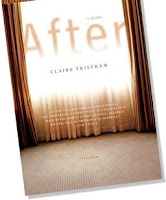 Claire Tristram's After is a disturbing view of one woman's struggle to come to terms with her husband's death at the hands of terrorists. I have not come to terms with the questions the text asks, but one thing is for certain, terrorism acts as an interruption to the life of the protagonist in a way that shifts the ground under her feat.
Claire Tristram's After is a disturbing view of one woman's struggle to come to terms with her husband's death at the hands of terrorists. I have not come to terms with the questions the text asks, but one thing is for certain, terrorism acts as an interruption to the life of the protagonist in a way that shifts the ground under her feat."Alternatively she wished for a disaster, like the ones they had imagined for one another the night before; a pox, a plague, a pure, holy terror event after which all that had come before would be erased in a brilliant white light, rendered irrelevant from one searing moment to the next, so that all the world could experience the same dislocation that she had. The shattered pieces would rearrange themselves eventually. Life would go on. But no one would return to the before-place, when everything was ordered and complete" (177).
If terrorism acts as an event that interrupts the status quo and puts us on new ground, does that mean it is an effective means of changing the world? What does it mean to desire that kind of dislocation of identity and attempt, as takes place in the book, to provoke this type of shift? Is that what art does already, or can art shift the ground beneath our feet to invoke a more ethical society to the degree that political dissidents will not need to use violence as a means of political action?





No comments:
Post a Comment